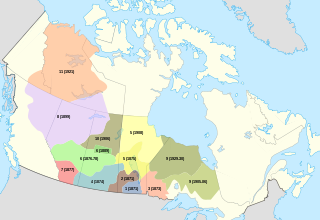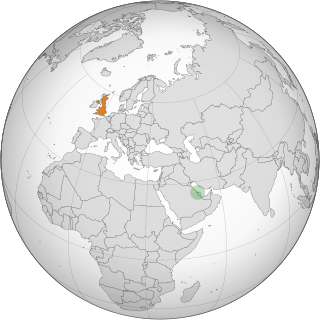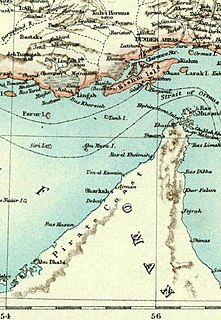Related Research Articles

Manama is the capital and largest city of Bahrain, with an approximate population of 157,000 people. Long an important trading center in the Persian Gulf, Manama is home to a very diverse population. After periods of Portuguese and Persian control and invasions from the ruling dynasties of Saudi Arabia and Oman, Bahrain established itself as an independent nation during the 19th century period of British hegemony.
{use dmy dates|date=October 2015}}

The United Arab Emirates (UAE) is a country in the eastern part of the Arabian Peninsula located on the southeastern coast of the Persian Gulf and the northwestern coast of the Gulf of Oman. The UAE consists of seven emirates and was founded on 2 December 1971 as a federation. Six of the seven emirates combined on that date. The seventh, Ras al Khaimah, joined the federation on 10 February 1972. The seven sheikdoms were formerly known as the Trucial States, in reference to the treaty relations established with the British in the 19th Century.
Bahrain was the central location of the ancient Dilmun civilization. Bahrain's strategic location in the Persian Gulf has brought rule and influence from mostly the Persians, Sumerians, Assyrians, Babylonians, Portuguese, the Arabs, and the British. Whilst the country had closest economic relations with Indians or South Asians for the longest time, much more than the Arabs themselves.

The Treaty of Waitangi is a treaty first signed on 6 February 1840 by representatives of the British Crown and Māori chiefs (rangatira) from the North Island of New Zealand. It has become a document of central importance to the history, to the political constitution of the state, and to the national mythos of New Zealand, and has played a major role in framing the political relations between New Zealand's government and the Māori population, especially from the late-20th century.

The national flag of Bahrain consists of a white band on the left, separated from a red area on the right by five triangles that serve as a serrated line. The five white triangles symbolize the five pillars of Islam. It is sometimes mistaken for the flag of Qatar, but that flag is maroon, not red, has more points (9) and normally has a much greater length-to-width ratio.

The flag of the United Arab Emirates contains the Pan-Arab colors red, green, white, and black. It was designed in 1971 by Abdullah Mohammed Al Maainah, who was 19 years old at that time, and was adopted on December 2, 1971. The main theme of the flag's four colors is the unity of Arab nations. In 2008, there was a minor change to the Emblem.
The dinar is the currency of Bahrain. It is divided into 1000 fils (فلس). The Bahraini dinar is abbreviated د.ب (Arabic) or BD (Latin). It is usually represented with three decimal places denoting the fils.

The Numbered Treaties are a series of eleven treaties signed between the First Nations, one of three groups of indigenous peoples in Canada, and the reigning monarch of Canada from 1871 to 1921. These agreements were created to allow the Government of Canada to pursue settlement and resource extraction in the affected regions, which include modern-day Alberta, British Columbia, Manitoba, Ontario, Saskatchewan, and the Northwest Territories. These treaties expanded the Dominion of Canada with large tracts of land in exchange for promises made to the indigenous people of the area. These terms were dependent on individual negotiations and so specific terms differed with each treaty.

Juffair is a suburban neighborhood of Manama, Bahrain. It was originally a separate village inhabited by Shia Muslims but it has been absorbed by the suburban expansion of Manama, and also includes large parts of land reclaimed from the sea.

A number of governments have set up permanent research stations in Antarctica and these bases are widely distributed. Unlike the drifting ice stations set up in the Arctic, the research stations of the Antarctic are constructed either on rock or on ice that is fixed in place.

Greater Iran refers to the regions of the Caucasus, West Asia, Central Asia, and South Asia where Iranian culture has had significant influence. Historically, these were regions long ruled by dynasties of various Iranian Empires, that incorporated considerable aspects of Persian culture through extensive contact with them, or where sufficient Iranian peoples settled to still maintain communities who patronize their respective cultures. It roughly corresponds to the territory on the Iranian plateau and its bordering plains. The Encyclopædia Iranica uses the term Iranian Cultural Continent for this region.
In Canada, an Indian band or band, sometimes referred to as a First Nation band or simply a First Nation, is the basic unit of government for those peoples subject to the Indian Act. Bands are typically small groups of people: the largest in the country, the Six Nations of the Grand River First Nation had 22,294 members in September 2005, and many have a membership below 100 people. Each First Nation is typically represented by a band council chaired by an elected chief, and sometimes also a hereditary chief. As of 2013, there were 614 bands in Canada. Membership in a band is controlled in one of two ways: for most bands, membership is obtained by becoming listed on the Indian Register maintained by the government. As of 2013, there were 253 First Nations which had their own membership criteria, so that not all Status Indians are members of a band.

Bahraini Jews constitute one of the world's smallest Jewish communities. Today the community has a synagogue, which though disused is the only one in an Arab Persian Gulf state, and a small Jewish cemetery. Various sources number Bahrain's Jewish community as being from 36 to 50 people. Nancy Khedouri stated that there were 36 Jews in Bahrain. Larry Luxner states that in 2006 there were 36 Jews in Bahrain. As of 2008, 37 Jews were believed to be in the country. According to a 2017 article on Bahrain the number of Jews in Bahrain is about 30. Currently, Bahraini Jews are not allowed to visit Israel, although, officially, Bahrain agreed to cease adherence to the economic boycott of Israel in exchange for a free-trade agreement with the United States in 2004.

Abdulhadi Abdulla Hubail al-Khawaja is a Bahraini political activist. On 22 June 2011, al-Khawaja and eight others were sentenced to life imprisonment following the suppression of an Iranian-backed rising against the Bahraini government. al-Khawaja has previously gone on a series of hunger strikes while serving his life sentence, in protest of the political conditions in Bahrain.
The Bahrain Telecommunications Regulatory Authority (TRA) is a governmental institution which regularly updates and publishes reports on the country's national numbering plan. The reports include all the number blocks used in the Kingdom of Bahrain.

Bahrain, officially the Kingdom of Bahrain, is a sovereign state in the Persian Gulf. The island nation comprises a small archipelago made up of 33 natural islands and an additional 51 artificial islands, centered around Bahrain Island which makes up around 83 percent of the country's landmass. The country is situated between the Qatar peninsula and the north eastern coast of Saudi Arabia, to which it is connected by the 25-kilometre (16 mi) King Fahd Causeway. According to the 2010 census, Bahrain's population is over 1.2 million, of which around half are non-nationals. At 780 square kilometres (300 sq mi) in size, it is the third-smallest nation in Asia after the Maldives and Singapore. The capital and largest city is Manama.

Bahrain–United Kingdom relations are bilateral relations between Kingdom of Bahrain and the United Kingdom of Great Britain and Northern Ireland. Bahrain has an embassy in London and the United Kingdom is one of only four European countries to maintain an embassy in Manama. Bahrain gained independence from the United Kingdom in 1971 and has since maintained strong diplomatic, military and trade relations.

The Trucial States was the name the British government gave to a group of tribal confederations in south-eastern Arabia which had been known as the "Pirate Coast". The name derived from the territories whose principal sheikhs had signed protective treaties with the British government from 1820 until 1892. They remained an informal British protectorate until the treaties were revoked on 1 December 1971. The following day six of the sheikhdoms formed the United Arab Emirates; the seventh – Ras Al Khaimah – joined the Federation on 10 February 1972.

Piracy in the Persian Gulf describes the naval warfare that was prevalent until the 19th century and occurred between seafaring Arabs in Eastern Arabia and the British Empire in the Persian Gulf. It was perceived as one of the primary threats to global maritime trade routes, particularly those with significance to British India and Iraq. Many of the most notable historical instances of piracy, referred to as resistance by modern Emirati historians, were perpetrated by the Al Qasimi tribe. This led to the British mounting the Persian Gulf campaign of 1809, a major maritime action launched by the British to bombard Ras Al Khaimah, Lingeh and other Al Qasimi ports. The current ruler of Sharjah, Sultan bin Muhammad Al Qasimi argues in his book The Myth of Piracy in the Gulf that the allegations of piracy were simply excuses used by the British to impose imperialism.
References
- ↑ "Archived copy". Archived from the original on 2011-07-20. Retrieved 2011-02-22.CS1 maint: archived copy as title (link)